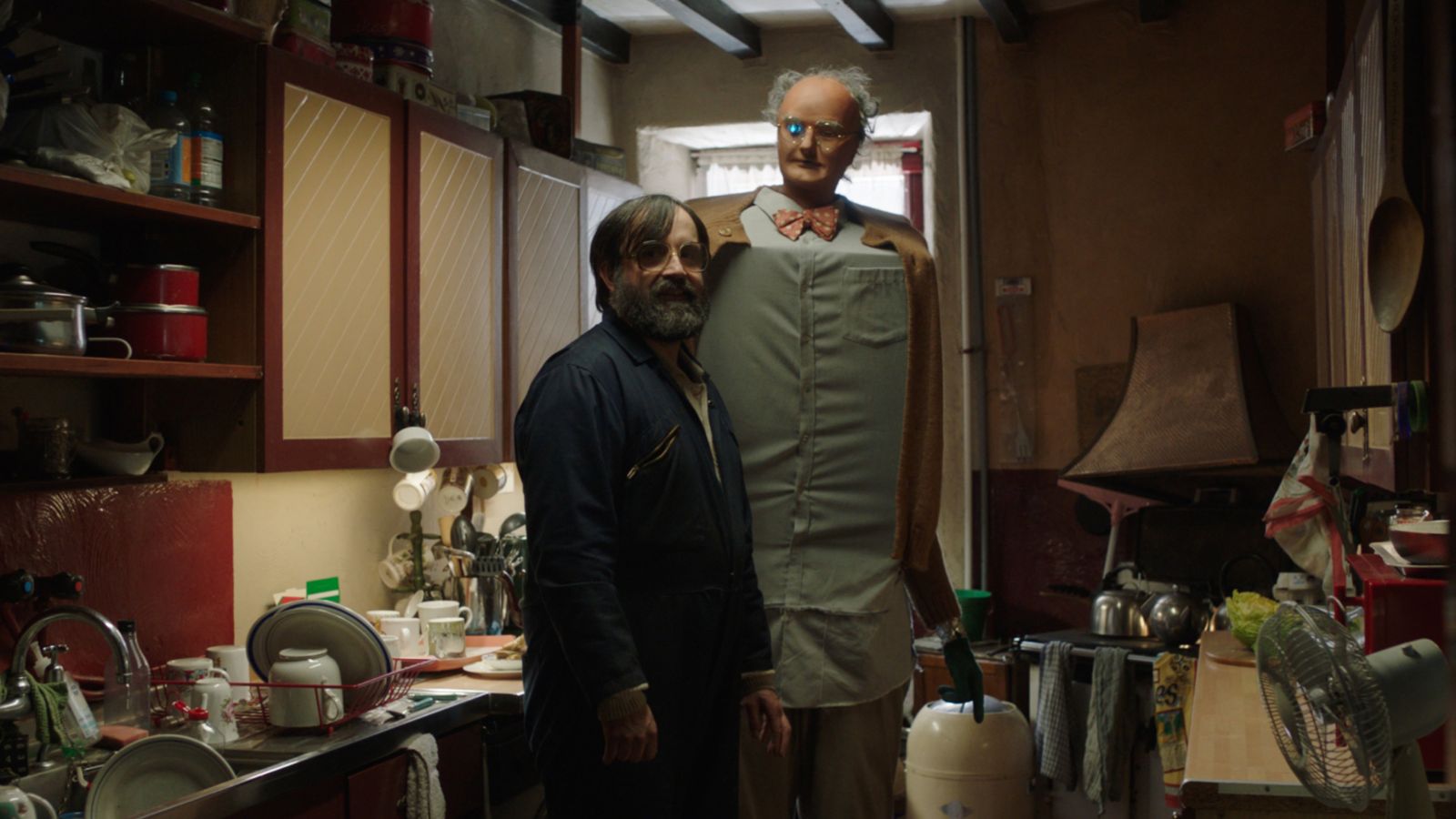Extended from the award-winning short of the same name, Jim Archer’s offbeat comedy Brian and Charles is borne of love and friendship. A sweet tale about a lonely inventor, the film (written by stars David Earl and Chris Hayward) leans on the earnest and the genuine. Whatever its issues reaching the already-short 90-minute runtime, it’s a delight: a happy-go-lucky story about found family, or in this case a created one.
Shot in mockumentary style, Brian and Charles follows Brian (Earl), a bearded, bundled man living in a Welsh town, roaming the countryside for scrap parts to build his inventions. From pine-cone bags to egg belts, he invents whatever he wants, regardless of utility. Bored and companionless, as evident by his Brian vs. Brian dartboard, he scrounges together a bunch of junk to build a crude robot using a washing machine for the boxiest torso seen in film. After a few failed attempts the robot suddenly jumpstarts to life, stealing cabbages and becoming sentient without much fuss.
The boxy robot chooses the name Charles Petrescu after Brian suggests others that aren’t to his liking. Early on he says to Charles “I am your friend”—a simple sentiment that forms the entire thesis of Brian and Charles, this easy choice to become friends for life despite one man’s inability to turn off his bright blue eye. Charles is an emotional centerpiece, though, unable to understand how far the outside world stretches—that he cannot walk to Honolulu, and that cabbages do not constitute for a balanced diet.
Archer’s feature debut is full of sweetness bordering on the saccharine. Its villain comes in the form of Eddie, a local bully reminiscent of a high-schooler pushing down the nerdy kid for his lunch money. The film takes on a pseudo-high school aura, with the town coming together for a big bonfire in a setpiece not dissimilar from the usual end-of-movie dance. It becomes cotton candy galore, the stakes rarely rising above comedic concern.
Giving Brian a love interest in Hazel (Sherlock’s Louise Brealey) extends the runtime, adding an extra layer of joy atop an already enjoyable little story. Hazel lends an outside perspective of Brian and Charles’ world, even if she isn’t too popular herself. Like them, and like most everyone in the film, she’s kind-hearted, open to oddities, awkwardness, and quiet more often than loud. Earl’s chemistry is present with both Brealey and Hayward through conversations that contain a level of discomfort, simply because no one knows exactly what to say or what to do. The dryness of the humor fits with the relationship between Brian and Charles, between Earl and Hayward, two friends who couldn’t seem happier while making the film.
Brian and Charles didn’t need to be a feature. It could have continued to peacefully and joyfully exist as a short, and its material stretches the story thin as a sheet in this extended form. But the charm and fun of its story outweighs a scrawny narrative. The Flat Stanley Project came to mind: a way to give kids a traveling buddy, a reason to learn about new people, new places, and the vastness of the rest of the world. Charles becomes Brian’s not-so-flat friend—someone to run errands with, to play darts against, to become a lens in which to see the bigness beyond his cottage. It’s easy to enjoy such an earnest portrait of an unconventional friendship, even if one of the friends only eats cabbages. They can still dance together, which seems more important, more resonant, than anything else.
Brian and Charles premiered at the 2022 Sundance Film Festival.

